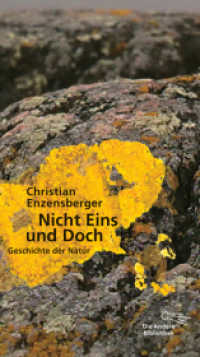- ホーム
- > 洋書
- > 英文書
- > History / World
基本説明
Vol. I: Aristotle's Ontology and the Middle Ages: The Tradition of Met., Book Zeta / Vol. II: Pauli Veneti: Expositio in duodecim libros Mataphisice Aristotelis.
Full Description
Focusing on the medieval reception of Book Zeta of Aristotle's Metaphysics, Volume One of this work offers an unprecedented and philosophically oriented study of medieval ontology against the background of the current metaphysical debate on the nature of material objects. Volume Two makes available to scholars one of the culminating points in the medieval reception of Aristotle's metaphysical thought by presenting the first critical edition of Book VII of Paul of Venice's Commentary on Aristotle's Metaphysics (1420-1424).
Contents
Volume I
Acknowledgements. . . . ix
Introduction . . . 1
1. The Philosophical Significance of Book Zeta . . . 1
2. The Monographic Chapters and the Centrality of Averroes . . . 9
3. Paul of Venice: A New Perspective . . . 13
4. Methodology and Future Perspectives . . . 15
1. Substance in Aristotle's Metaphysics, Book Zeta . . . 19
Introduction . . . 19
1. The Notion of Substance in the Categories . . . 21
2. Metaphysics, Book Z: Some General Problems of Interpretation . . . 27
3. Substance and Subjecthood in Met. Z 1 and Z 3 . . . 35
3.1. Substance and Accidents . . . 35
3.2. The Subject . . . 41
3.3. The Stripping-away Argument . . . 47
3.4. Met. Z 3: Two Additional Issues . . . 54
4. Essence in Z 4-6 . . . 57
4.1. A Logical Enquiry . . . 57
4.2. The Essence of Substance and Accidents in Met. Z 4-5 . . . 64
4.3. Z 6's Identity Thesis . . . 81
5. Generation in Met. Z 7-9 . . . 88
5.1. Introduction . . . 88
5.2. The Synonymy Principle . . . 90
5.3. The Ingenerability of Form (and Matter) in Met. Z 8. . . . 98
6. Definition . . . 101
6.1. The Object of Definition in Z 10-11 . . . 101
6.2. The Unity of Definition in Met. Z 12 . . . 111
7. Universals . . . 116
7.1. The Problem . . . 116
7.2. No Universal Is Substance: Z 13's Argument . . . 122
7.3. Particulars and Definition: Met. Z 15 . . . 130
8. Substance As Cause in Met. Z 17 . . . 134
2. Substance in Averroes's Long Commentary on the Metaphysics, Book VII . . . 141
1. Averroes's Interpretation of Met. Z . . . 141
1.1. What Z Is About . . . 141
1.2. Logic and Metaphysics . . . 146
1.3. The Question of Platonism. . . . 150
2. The Subject. . . . 153
3. Essence . . . 158
3.1. Essence in Met. Z 4 . . . 158
3.2. Z 5's Puzzles. . . . 165
3.3. Averroes's View on Accidents: Some General Conclusions . . . 171
3.4. The Meaning of Met. Z 6 . . . 173
4. Averroes's Treatment of Generation (Met. Z 7-9) . . . 182
4.1. The Meaning of Z 7-9: An Anti-Platonic Argument . . . 182
4.2. The Defence of the Synonymy Principle and the Case of Spontaneous Generation . . . 190
5. Definition . . . 199
5.1. The Object of Definition in Met. Z 10-11 . . . 199
5.2. The Unity of Definition: Genus As Matter . . . 213
6. Universals . . . 218
6.1. Introduction: An Overview of the Section on Universals . . 218
6.2. Z 13's General Meaning . . . 222
7. Substance As Cause in Met. Z 17 . . . 226
3. Aquinas's Understanding of Metaphysics Z. . . . 235
Introduction . . . 235
1. Aquinas on the Structure of Met. Z . . . 236
1.1. The Logical Character of Book Z . . . 237
1.2. The Anti-Platonic Character of Book Z . . . 241
2. Aquinas's General Interpretation of Aristotle's Doctrine of Substance . . . 245
2.1. Aquinas's Compatibilism and the Role of the Categories . . 245
2.2. The Notion of Subject in Met. Z 3 . . . 249
3. Essence . . . 258
3.1. The Essence of Substance and Accidents in Met. Z 4-5 . . . 258
3.2. The Identity Thesis (Met. Z 6) . . . 269
4. The Generation of Substances in Met. Z 7-9 . . . 275
4.1. The Role of Met. Z 7-9: An Anti-Platonic Argument . . . 275
4.2. Generation and Substantiality: The Primacy of Composites . . . 282
5. Definition . . . 286
5.1. The Object of Definition (Met. Z 10-11). . . . 286
5.2. The Unity of Definition (Met. Z 12) . . . 295
6. Universals . . . 300
6.1. More on the Anti-Platonic Line . . . 300
6.2. Aquinas's Interpretation of Met. Z 13: Universality and Substantiality . . . 305
6.3. Appendix: Aquinas on the Status of Aristotle's Forms . . . 311
7. Substance As Cause in Met. Z 17: A Departure from the Logical Level? . . . 317
4. Albert the Great's Metaphysics, Book VII . . . 325
Introduction . . . 325
1. Albert's Interpretation of Book Z and Avicenna's Doctrine of Essence . . . 329
2. Treatise 1: A Defiationary Account of Accidents . . . 340
3. Treatise 2: Anti-Platonism. . . . 350
3.1. The Identity Thesis . . . 350
3.2. Inchoation of Forms . . . 355
4. Treatises 3 and 4: Essence and Definition . . . 361
4.1. Preliminary Remarks . . . 361
4.2. Essence, Form and Matter . . . 363
4.3. Genus and Matter . . . 368
4.4. Formal Matter . . . 372
5. Treatise 5: Universals . . . 375
5. Alexander of Alexandria and Paul of Venice . . . 385
Introduction . . . 385
1. The Structure of Alexander's Commentary. Alexander and Paul Compared. . . . 387
2. Alexander and Averroes. . . . 391
2.1. Alexander's Use of Averroes . . . 391
2.2. Alexander and Averroes on the Ontological Status of Accidents . . . 393
3. Alexander and Aquinas . . . 403
4. Alexander and Paul of Venice . . . 410
6. Paul of Venice As a Reader of Averroes. The Case of Essence and Definition . . . 421
Introduction . . . 421
1. The Structure of Paul of Venice's Commentary on the Metaphysics and the Role of Averroes's Long Commentary. . . . 422
2. Met. Z 10 in the Medieval Interpretation. Averroes, Aquinas and Alexander . . . 431
3. Paul of Venice's Interpretation of Met. Z 10 . . . 437
3.1. The General Strategy . . . 437
3.2. Points of Detail . . . 442
4. Met. Z 11 in the Medieval Interpretation. Averroes, Aquinas and Alexander . . . 446
5. Paul of Venice's Interpretation of Met. Z 11: Aquinas and
Averroes Reconciled . . . 460
Summaries of the Text. Paul of Venice's Commentary on the Metaphysics, Book VII . . . 467
Book VII, Treatise I . . . 467
Book VII, Treatise II . . . 564
Book VII, Treatise III. . . . 684
Bibliography . . . 753
General Index. . . . 765
Volume II
Acknowledgements. . . . vii
Introduction . . . 1
1. Paul of Venice's Intellectual Pro_le . . . 1
2. Paul of Venice's Commentary on the Metaphysics: The Manuscripts . . . 3
3. The Text of Paul's Commentary on the Metaphysics, Book VII 8
3.1. The Relationship between the Two Manuscripts . . . 8
3.2. The Value ofMand Pv . . . 21
4. Aristotle's and Averroes's Texts . . . 22
Conspectus Siglorum . . . 25
Pauli Veneti: Expositio in Duodecim Libros Metaphisice Aristotelis, Liber VII . . . 27
Tractatus I . . . 29
Capitulum I . . . 29
Capitulum II . . . 80
Capitulum III . . . 112
Capitulum IV . . . 176
Tractatus II . . . 205
Capitulum I . . . 205
Capitulum II . . . 254
Capitulum III . . . 315
Capitulum IV . . . 408
Tractatus III . . . 441
Capitulum I . . . 441
Capitulum II . . . 467
Capitulum III . . . 510
Capitulum IV . . . 532
Bibliography . . . 581
Index locorum . . . 587
Index authorum . . . 604
Index authorum et philosophorum a Paulo Veneto nominatorum . . . 605








